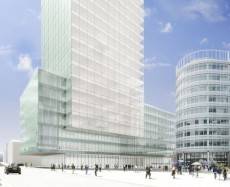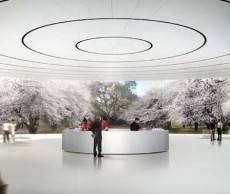January 28, 2014
International serviced office provider in first single floor letting for ‘Cheesegrater’
 British Land and Oxford Properties have announced the Leadenhall Building in the City of London – known as the ‘Cheesegrater’ due to its distinctive tapered profile – has been let to serviced office business Servcorp. The Sydney-based firm already provides businesses with flexible space in some of the world’s most famous buildings, including The Seagram Building, Park Avenue, New York, IFC 2 Hong Kong, Trust Tower Marunouchi, Tokyo and Emirates Towers, Dubai. This, the first single floor letting in the building, is on the 30th floor, which provides 11,851 sq ft of space. Because of the building’s design, floorplates range from 21,000 sq ft on level 5 to 6,200 sq ft on the top floor (level 45). (more…)
British Land and Oxford Properties have announced the Leadenhall Building in the City of London – known as the ‘Cheesegrater’ due to its distinctive tapered profile – has been let to serviced office business Servcorp. The Sydney-based firm already provides businesses with flexible space in some of the world’s most famous buildings, including The Seagram Building, Park Avenue, New York, IFC 2 Hong Kong, Trust Tower Marunouchi, Tokyo and Emirates Towers, Dubai. This, the first single floor letting in the building, is on the 30th floor, which provides 11,851 sq ft of space. Because of the building’s design, floorplates range from 21,000 sq ft on level 5 to 6,200 sq ft on the top floor (level 45). (more…)


























January 21, 2014
Working from Home Week: good idea, but it doesn’t suit everyone
by Sara Bean • Comment, Flexible working, Workplace
Yesterday was hyped as the most depressing day of the year, but it also marked the beginning of Working from Home Week (20-26 January 2014). The idea will resonate with anyone struggling to get out of bed and join the January commute. There are many advantages to home working; but depending on your personality and personal circumstances there are also disadvantages. Yes, you’ll avoid traffic jams/crowded trains, take the dog for a walk when you fancy and can concentrate on a project without annoying interruptions. But working from home has its disadvantages too; including feeling isolated and finding it difficult to remain motivated. Rather like those who decide to move to the country but find it’s too quiet – for some people the buzz of the workplace is vital to their productivity and wellbeing. (more…)